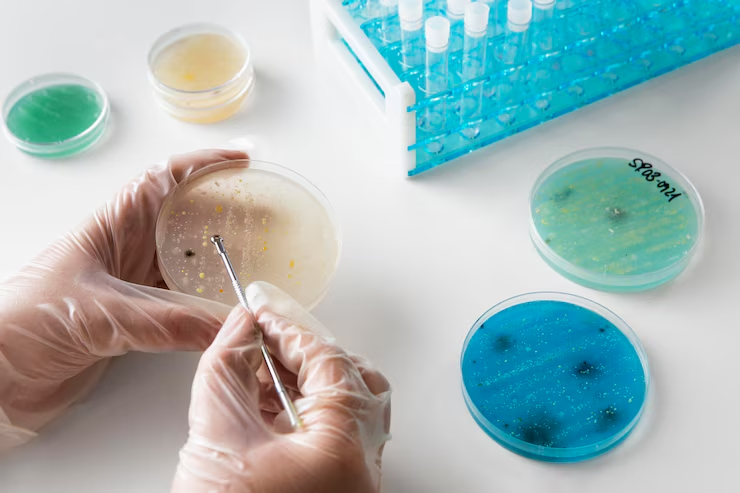
Global Research Antibodies and Reagents Market Overview
The global research antibodies and reagents market is expected to expand at a CAGR of 7% between 2025 and 2030, driven by the rising need for high-specificity antibodies, advanced reagents, and next-generation research tools across proteomics, genomics, and cellular biology. As pharmaceutical and biotechnology companies accelerate their drug discovery and development programs, the demand for precision research tools continues to grow.
Key Request a free sample copy or view report summary: https://meditechinsights.com/research-antibodies-and-reagents-market/request-sample/
The expanding role of biologics, cell-based therapies, and personalized medicine further strengthens the market landscape, pushing organizations to adopt high-quality, validated antibodies and assay-ready reagents. Increasing prevalence of chronic and infectious diseases is fueling research investments worldwide, while the rapid evolution of genomic technologies, molecular diagnostics, and translational research contributes to sustained market growth. As scientific research becomes more data-driven and automated, the requirement for consistent, reproducible, and scalable reagent solutions is expanding rapidly, positioning the market for robust development in the coming years.
Report Overview
The research antibodies and reagents market includes a diverse range of products used across molecular biology, cell biology, immunology, microbiology, and drug development workflows. This encompasses primary and secondary antibodies, detection reagents, immunoassay kits, stains and dyes, buffers, substrates, and a wide range of consumables essential for laboratory research. Market expansion is supported by rising investment in R&D activities by academic institutions, biotech companies, government organizations, and pharmaceutical enterprises. Growing incidence of chronic diseases including cancer, autoimmune disorders, and neurological conditions is driving the demand for advanced research tools that support biomarker discovery and therapeutic development.
Advancements in high-throughput research systems, single-cell technologies, and multiplex assays have transformed the scientific research ecosystem, enabling researchers to handle complex biological data with greater precision. In addition, industry collaborations, global reagent distribution networks, and the emergence of custom antibody development services are creating new opportunities for both established manufacturers and emerging players. The increasing complexity of modern research requires antibodies and reagents with improved sensitivity, specificity, and reproducibility, fostering continuous innovation across the market.
Rising Demand for High-Specificity Antibodies and Research-Ready Reagents
The escalating need for accuracy and reproducibility across research studies has boosted the demand for highly specific and validated research antibodies. As fields such as oncology, immunology, proteomics, and neuroscience continue to evolve, the number of specialized targets has grown significantly, creating a strong demand for reliable antibody solutions. Researchers are increasingly moving toward recombinant antibodies due to their enhanced batch-to-batch consistency, reduced variability, and improved performance compared to conventional antibodies. Recombinant formats also allow for engineered specificity, which is particularly valuable in applications involving complex signaling pathways and multi-omics research.
The growing reliance on contract research organizations, academic laboratories, and biopharmaceutical companies further contributes to the use of standardized, assay-ready reagent kits. These reagents are designed for compatibility with automation platforms, reducing manual errors and improving throughput in labs conducting large-scale experiments. Industry estimates indicate that recombinant antibody segments and high-performance secondary antibodies will experience strong growth in the coming years, fueled by their critical role in immunohistochemistry, Western blotting, ELISA, flow cytometry, and advanced imaging applications. As the push for reproducibility intensifies, validated antibody panels and research-ready reagent kits are becoming indispensable tools supporting cutting-edge biological discoveries.
Technological Advancements Driving Innovation in Research Tools and Reagents
Technological innovation remains a central force shaping the research antibodies and reagents landscape. Breakthroughs in recombinant antibody production, hybridoma alternatives, and phage display technologies are enabling the creation of more precise, customizable antibody solutions. Continuous improvements in multiplexing capabilities and high-throughput platforms allow scientists to study multiple biological parameters simultaneously, improving efficiency and reducing experimental costs.
The integration of artificial intelligence and machine learning has transformed the way antibodies are designed, optimized, and validated. AI-driven platforms enhance antigen prediction, structural modeling, and reagent performance forecasting, enabling companies to bring next-generation antibodies to market faster. Additionally, the increasing use of bioinformatics tools and advanced imaging technologies supports deep biological analysis, opening new pathways for diagnostics and drug discovery.
Developments in CRISPR, single-cell sequencing, and spatial biology are expanding the application scope for antibodies and reagents in functional genomics and personalized therapeutics. These innovations support precise gene-editing experiments, enable real-time visualization of cellular behavior, and enhance researchers’ ability to decode disease mechanisms at the molecular level. As laboratories adopt more automated and digitized workflows, the demand for scalable, high-performance reagents continues to grow.
Competitive Landscape Analysis
The research antibodies and reagents market is highly competitive, characterized by the presence of leading global manufacturers and innovative biotech companies. Prominent players include Thermo Fisher Scientific, Merck KGaA, Abcam plc, Bio-Rad Laboratories, and Cell Signaling Technology, each offering extensive product portfolios and specialized antibody solutions. These companies are actively expanding their recombinant antibody capabilities, improving e-commerce platforms, and investing in automated production technologies to meet rising demand. Strategic collaborations with academic institutions, research consortia, and pharmaceutical companies are further supporting product innovation and global distribution. Emerging players are focusing on niche markets, such as rare disease research, advanced multiplex assays, and AI-enabled custom antibody development, intensifying competitive dynamics.
Market Drivers
Increasing life science research spending
Growth of recombinant antibodies and high-throughput assays
Advancements in precision medicine and genomics research
Increasing biopharma and CRO collaborations
Market Opportunities
Expansion of e-commerce channels
Growth in emerging markets
Adoption of AI-based antibody design and reagent optimization
Download pdf Brochure: https://meditechinsights.com/research-antibodies-and-reagents-market/request-sample/
About Medi-Tech Insights
Medi-Tech Insights is a healthcare-focused business research & insights firm. Our clients include Fortune 500 companies, blue-chip investors & hyper-growth start-ups. We have completed 100+ projects in Digital Health, Healthcare IT, Medical Technology, Medical Devices & Pharma Services in the areas of market assessments, due diligence, competitive intelligence, market sizing and forecasting, pricing analysis & go-to-market strategy. Our methodology includes rigorous secondary research combined with deep-dive interviews with industry-leading CXO, VPs, and key demand/supply side decision-makers.
